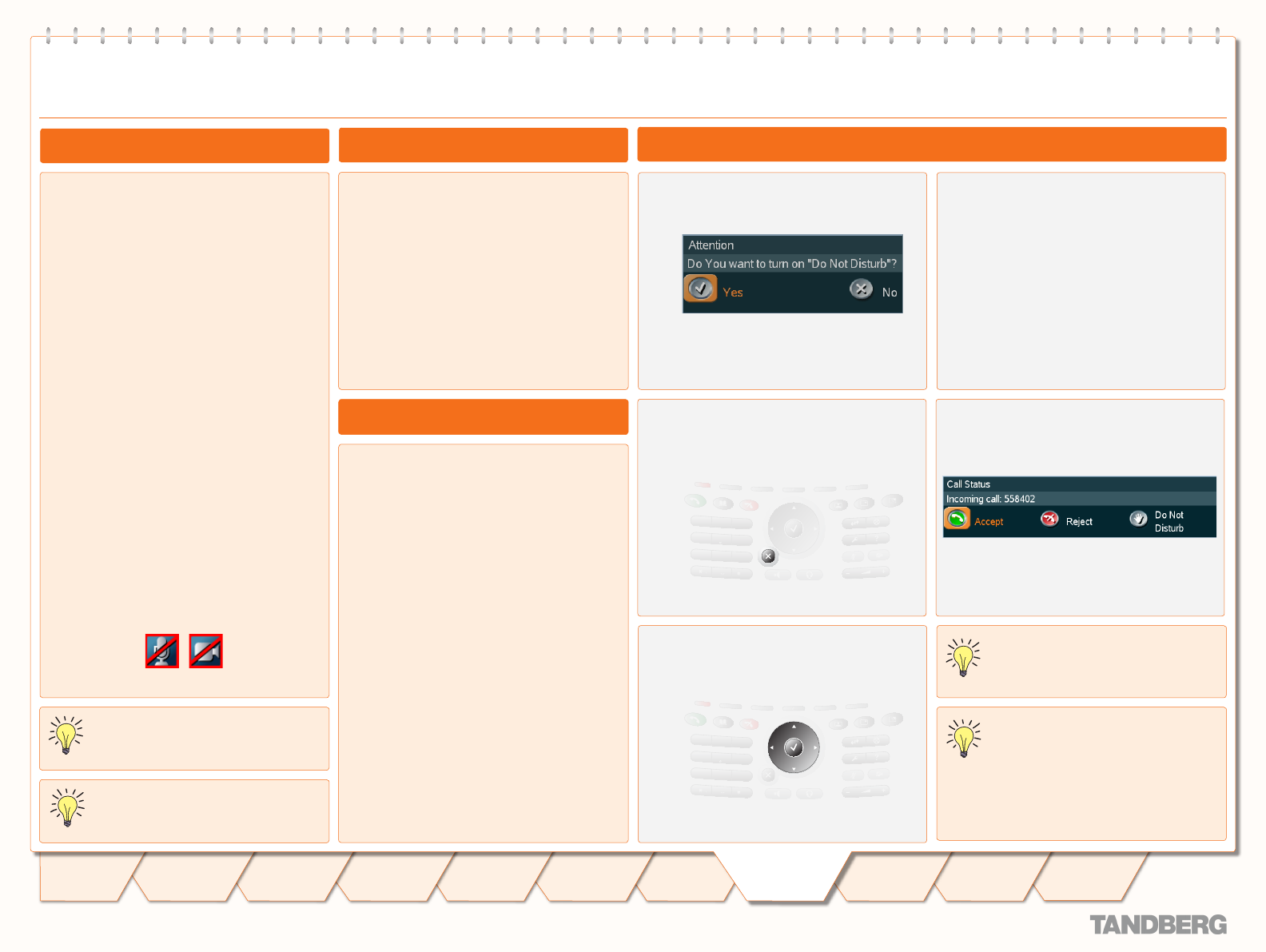
D 14067.01
05.2007
23
Table of
Contents
Operating
Principles
Making
Video
Calls
Making
Calls Using
Phone Book
Phone Book
Details
Incoming
Calls
Calling More
Than One
Video Meeting
Features
Contact
Information
Unpacking &
Installation
Making
Telephone
Calls
TANDBERG ENTRYPOINT
USER GUIDE
Incoming
Calls
TANDBERG 150
MXP
USER GUIDE
You may want to set up your system so that the
microphone and/or the camera are switched off
whenever you receive an incoming call.
By pressing
the
Microphone Off key and
the
Camera Off key
you will prevent callers from hearing you and
seeing you without your control (press again to
reactivate).
To combine convenience and privacy, your
150MXP may be set up to automatically accept
an incoming call, but with the microphone
switched off. In this case you must switch the
microphone back on manually yourself (just
press the
Microphone Off key to reactivate a
disabled microphone).
You may also have your system set up so that
you always must answer all incoming calls
manually.
These settings are parts of the
Adminstrator’s
Guide available. Your System Adminstrator, may
or may not, have password protection activated
to prevent unauthorized alterations of these and
other settings. If in doubt, consult your System
Adminstrator.
Whenever microphone and camera are disabled,
these icons appear on your screen:
•
•
Do Not Disturb
A Few Words on Privacy
You are not stuck with the audio signal alerting
you that an incoming call is on its way. This
may be changed, see Audio Settings in the
Adminstrator’s Guide.
Do observe, however, that these settings
may be password protected by your System
Adminstrator.
Want to Change the Alert Signal?
An alternative to the above could be the
use of the Do Not Disturb feature to the
right.
A message will be sent to the far end
whenever you have disabled your
microphone and/or your camera.
There is a Do Not Disturb function available on
your system. When set to On, all incoming calls
are blocked from your system.
Outside a call, press the red Call Reject
key. A dialogue box will appear:
Press OK to activate the feature. The
screen will now turn black, and the
following text will appear:
Press any key to clear Do Not Disturb
Press Reject to leave the menu, keeping
the feature deactivated.
When Do Not Disturb has been activated
and you receive an incoming call, the
following dialogue box will be produced:
Use the Cursor keys to navigate and OK
to make your selection and proceed.
Whenever Do Not Disturb is activated,
the far end will be informed that the
called is busy.
Assume Do Not Disturb has not been
activated. Choosing Do Not Disturb
when receiving an incoming call will
then do two things: It rejects the
incoming call (in the same way as choosing
Reject), and sets the Do Not Disturb
functionality to On.
About Do Not Disturb
1
2
3
abc
def
4
5
6
jkl
mno
ghi
7
8
9
tuv
wxyz
pqrs
0
a/A
1
2
3
abc
def
4
5
6
jkl
mno
ghi
7
8
9
tuv
wxyz
pqrs
0
a/A
1
2
3
abc
def
4
5
6
jkl
mno
ghi
7
8
9
tuv
wxyz
pqrs
0
a/A
1
2
3
abc
def
4
5
6
jkl
mno
ghi
7
8
9
tuv
wxyz
pqrs
0
a/A
Handling Incoming Calls (II)
